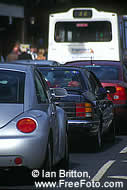EEA warns of transport sector toll on environment
The European Environment Agency (EEA) has published a scientific report warning of the increasing pressure on Europe's environment created by the growth of road and air transport. The expansion of European road and air travel as a result of economic growth has made the transport sector a major contributor to several important environmental problems. The TERM 2001 report, published in the run up to a joint meeting of EU transport and environment ministers in Leuven and Louvain-la-Neuve, Belgium, from 14 to 16 September, highlights the need for a rethink of the link between economic and transport growth. EEA executive director Domingo Jiménez-Beltrán said: 'Overall, the report shows that transport in the EU is becoming less and not more environmentally sustainable. Progress towards a more sustainable transport system has become imperative and efforts to integrate environmental considerations into transport policy have to be redoubled.' The report found that transport contributes about a quarter of all manmade EU carbon dioxide emissions. More worryingly, energy consumption in the transport sector has increased by 47 per cent since 1985, compared to a 4.2 per cent increase recorded for other economic sectors. The main culprit for fossil fuel emissions is road transport, which releases 84 per cent of all emissions, followed by aviation. Furthermore, CO2 emissions from transport increased by 15 per cent between 1990 and 1998. The EEA warns that greenhouse gas emissions produced by the transport sector are seriously jeopardising the achievements of the EU's emission reduction targets under the Kyoto protocol, which commits Europe to cutting its greenhouse gas emissions to 8 per cent below 1990 levels between 2008 and 2012. Amongst the good news was the finding that technological improvements and cleaner fuels have made vehicles less polluting per transport unit. Transport sector emissions of acidifying gases also fell by 20 per cent between 1990 and 1998, and ground level ozone pollutants fell by one quarter during the same period. In spite of the progress made, however, the report found that extra effort is still needed to meet EU targets on the emission of these substances. The EEA also reported that although urban air quality is improving, pollution levels still pose health risks. And while new car models may be cleaner and more efficient, the EEA says we now own more of them than ever before. The EU car fleet grew by 64 per cent between 1980 and 1998. Trucking has also grown, rising from 33 per cent of freight transport per tonne-kilometre in 1980 to 43 per cent in 1998. The report also found that the environmental impact of European transport extends beyond polluting emissions. The growing transport infrastructure is causing increasing fragmentation of Europe's countryside. The motorway network has increased in length by over 70 per cent since 1980, while conventional railways and inland waterways have shrunk by nearly 8 per cent. Transport also carries a high cost in human and economic terms. The 'external' costs of transport - covering environmental damage, accidents and congestion - are estimated at 8 per cent of Europe's GDP. The report also found that while transport fatalities are falling, accidents still claim 41,000 lives a year. The number of injuries is roughly 40 times the level of fatalities, and is falling more slowly than the death rate. The European Council has singled out transport as one of the four priority areas where sustainable development policy has to be prioritised, and the European Commission is currently reconsidering its common transport policy. On 12 September the Commission voted to adopt the White Paper 'European transport policy for 2010: Time to decide.' The paper contains around 60 measures to shift the balance towards the least polluting modes of transport by revitalising the railways, promoting water transport and improving links between different transport systems. In this way, the Commission hopes to sever the link between economic and transport growth. The paper also emphasises users' needs, putting passenger safety and service efficiency at the top of the list. Transport and energy vice president Loyola de Palacio said: 'The European Union must meet the expectations of Europeans and recognise requirements that are at times contradictory, in order to contribute to economic development while at the same time improving our quality of life.' She added: 'Europe's citizens deserve an efficient transport system offering a high level of quality and safety: the white paper lays the foundations for this on the basis of a more imaginative and rational use of the different means of transport and infrastructures.' The paper will be debated by ministers at the Transport and Environment council in Leuven and Louvain-la-Neuve between 14 and 16 September. An extraordinary council meeting of European transport ministers was convened in Brussels on 13 September to evaluate EU transport safety measures in the wake of the terrorist hijackings in America on 11 September. Options will be considered for reinforcing existing systems and strengthening international cooperation. The European Commission and the Belgian presidency will also submit a working document on security matters to the Transport council.



